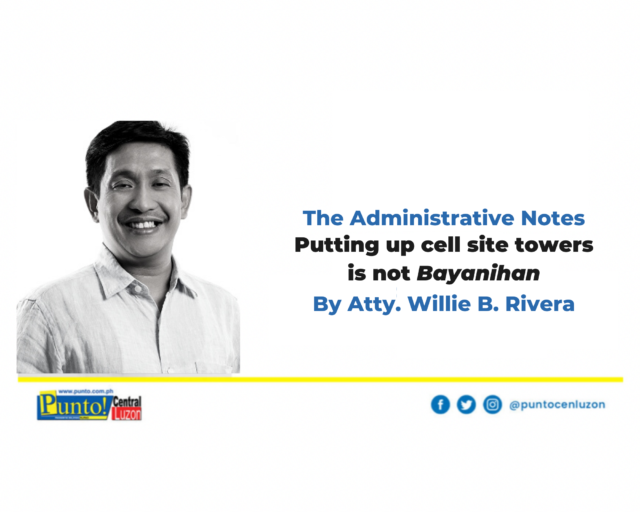PERHAPS ONE of the more controversial provision contained in Republic Act No. 11494 otherwise known as “Bayanihan to Recover As One Act” is the temporary suspension of certain requirements for telecommunication companies in the construction of their telecommunications and internet infrastructure, including cell site towers. Taking advantage of this 3 year-moratorium, telecommunication giants started installing their cell site towers all over the country, amid the pandemic situation, causing varied reactions from homeowners and residents who would be greatly affected by the health risks posed by cell site towers.
In Angeles City alone, several cell site towers sprouted. New player Dito Telecoms and telecom leader Smart Communications commenced the erection of their cell site towers, surprisingly, within crowded subdivisions, which obviously drew negative reactions from residents and homeowners, questioning the propriety and legality of the construction of the cell site towers.
As it is, there was no prior public consultation conducted by the telecommunication companies. In the case of Smart Communications, there was no ordinance passed by the Sangguniang Panlungsod of Angeles City allowing the construction of the cell site towers in some particular areas in Angeles City. These are patent violations of the law.
When opposed and objected to, telecommunication companies justified their acts to be within the bounds of the law, and their reliance on Section 4 subparagraph (ii )(1) of Republic Act No. 11494 which provides, that;
(ii) Undertaking measures in partnership with appropriate internet and communication service providers in the acceleration of the deployment of critical Information and Communications Technology (ICT) infrastructure particularly additional cell towers, equipment, software, and wireless technologies throughout the country to address the need for digital connectivity, internet speed and stability, and Cybersecurity in E-Commerce, E-Government, online learning, and telecommuting in order to sufficiently meet the significant additional shift of the general public to online services and platforms and to home and mobile communication units for doing work from home, for completing commercial and other transactions, for convening meeting and conducting conferences and seminar/webinars, and for obtaining educational instruction during the COVID-19 pandemic through the Department of Information and Communications Technology (DICT). Such measures shall include the following:
(1) Temporary suspension of requirements to secure permits and clearances for the construction of telecommunications and internet infrastructure.
Except for the building permit issued by the Office of the Building Official pursuant to Presidential Decree No. 1096 or the “National Building Code of the Philippines”, as amended, and the height clearance permit from the Civil Aviation Authority of the Philippines (CAAP), no national or local or permit or clearance shall be required in the construction, installation, repair, operation and maintenance of telecommunications and internet infrastructure by independent tower companies registered with the DICT, or holders of certificates of public convenience and necessity or provisional authority granted by the National Telecommunications Commission NTC) to public telecommunication entities, for a period of three (3) years from the effectivity of this Act: Provided, That for homeowners and other community clearances, the requirements provided under Section 15 of Republic Act No. 11032 or the “Ease of Doing Business and Efficient Government Service Delivery Act”, in relation to Section 10(k) of Republic Act No. 9904 or the “Magna Carta for Homeowners and Homeowners’ Associations”, shall apply.
At first glance , one may argue that the construction of the cell site towers is in accordance with Republic Act No. 11494. As it is, the requirements needed to secure permits and clearances are quite numerous and taxing for the telecommunication companies to comply with; hence, the same were lessened with the enactment of Republic Act No. 11494. However, Republic Act No. 11494 cannot impair nor modify the provisions of the Constitution. To emphasize, the Constitution is the highest law of the land, and laws, such as Republic Act No. 11494, may be invalidated if it is found to be in conflict with the Constitution.
Under the Constitution, particularly Section 16, Article II, “(T)he State shall protect and advance the right of the people to a balanced and healthful ecology in accord with the rhythm and harmony of nature.” To allow the construction of the cell site towers within the crowded subdivisions is to expose the residents to potential health risks.
Moreover, the right to public consultation is clearly mandated under Republic Act No. 7160 or the Local Government Code, which prevails over Republic Act No. 11494 being a specific law. “It is a canon of statutory construction that a special law prevails over a general law — regardless of their dates of passage — and the special is to be considered as remaining an exception to the general.”
As it is, the residents were deprived of their right to public consultations when the telecommunication companies proceeded with the construction of the cell site towers without initiating public consultations, totally disregarding the concerns of the residents.Hence, a valid ground to initiate a complaint against these telecommunication companies to declare the implementation of their project as illegal.
This principle has been enunciated in the case of Boracay Foundations Inc., vs. The Province of Aklan et. al., where the Supreme Court held:
“Under the Local Government Code, therefore, two requisites must be met before a national project that affects the environmental and ecological balance of local communities can be implemented: prior consultation with the affected local communities, and prior approval of the project by the appropriate sanggunian. Absent either of these mandatory requirements, the project’s implementation is illegal.”
Patently, in allowing telecommunications companies to rely on the temporary suspension of government clearances and permits under Republic Act No. 11494, and proceed with the construction of the cell site towers without the conduct of any public consultation, is a clear circumvention of laws.
While the government pushes for modernization and improvement of technology with the construction of the cell site towers, if the same would pose health-related risks and instill health-related fears among the residents, then the same suffers from infirmity, no matter how noble the purpose may be. Modernization will not serve if it poses a threat to the individual’s fundamental right, not just to health and safety, but, ostensibly, to life preservation itself. Government should be reminded that, in its efforts to modernize and keep up with technology, it cannot trample upon the basic rights of its people. As the saying goes, one cannot “put the cart before the horse.”





